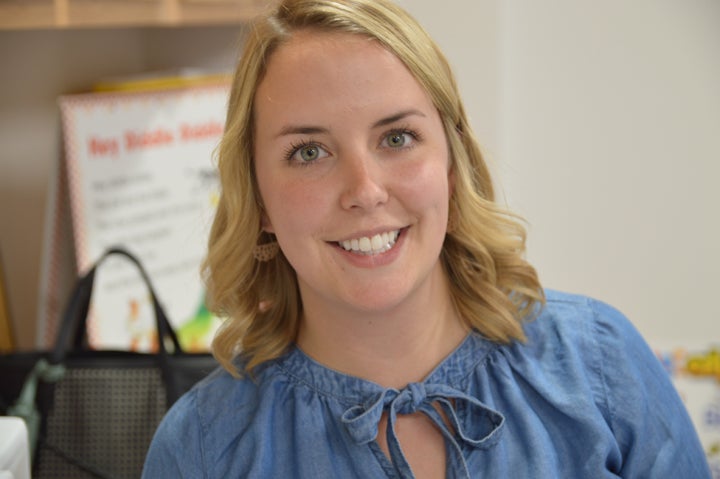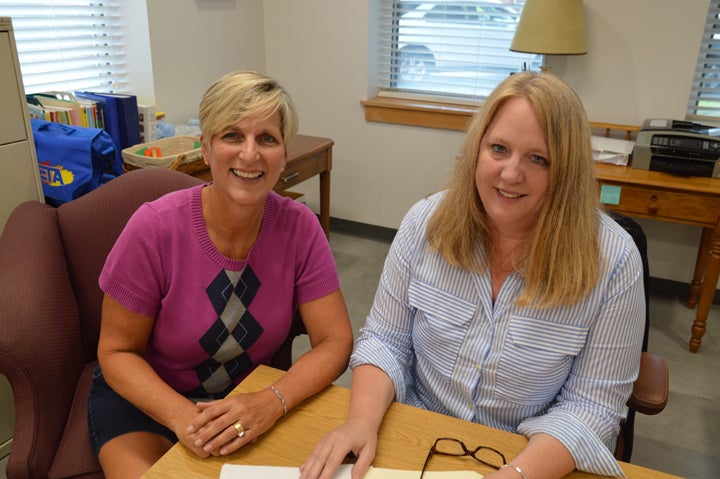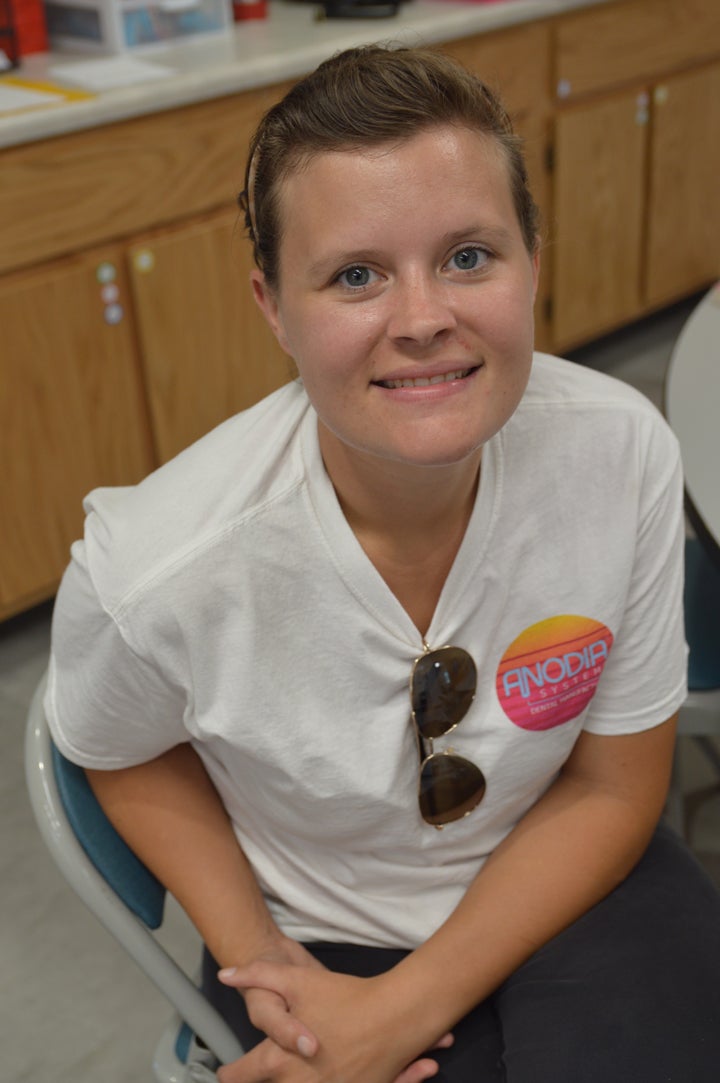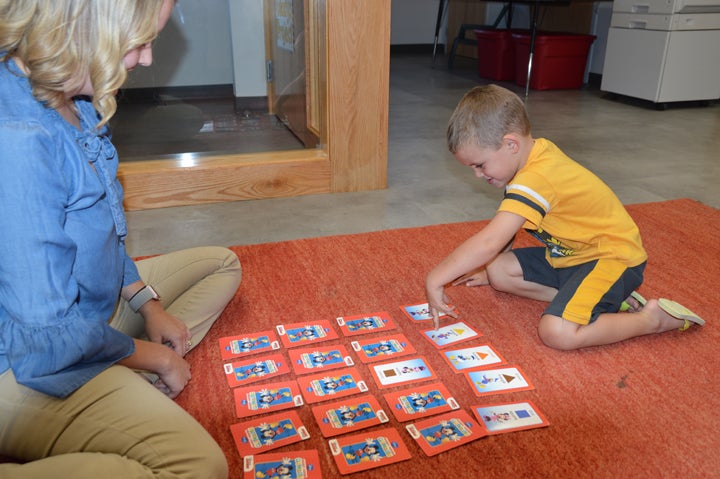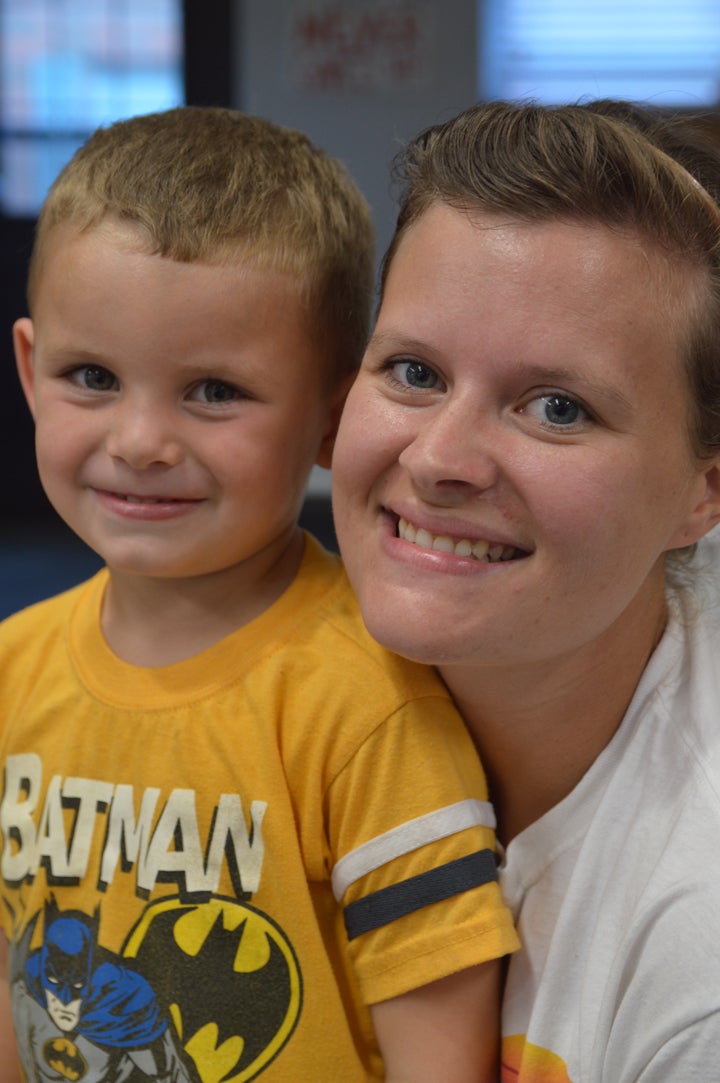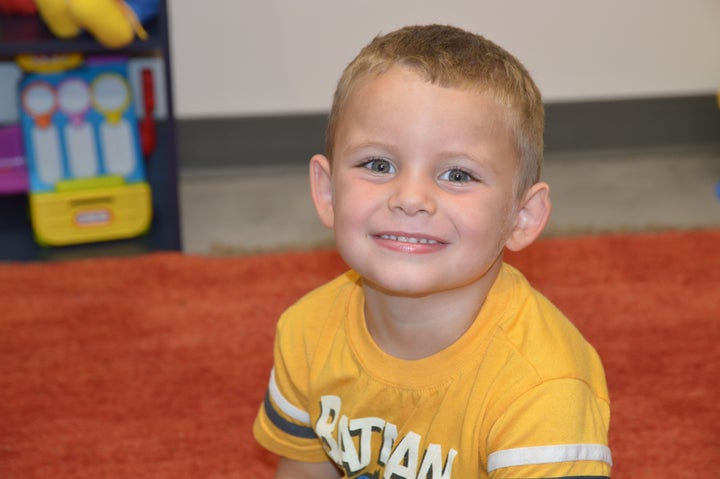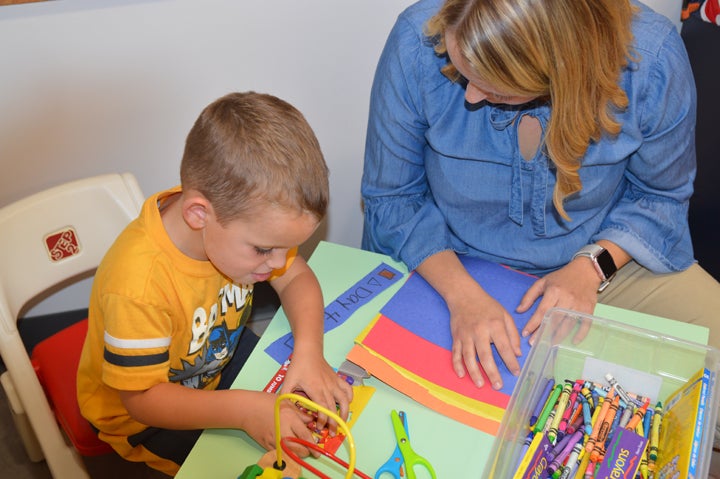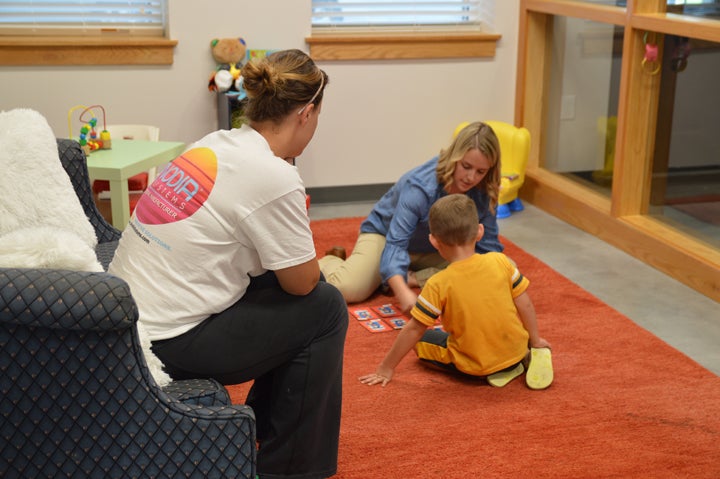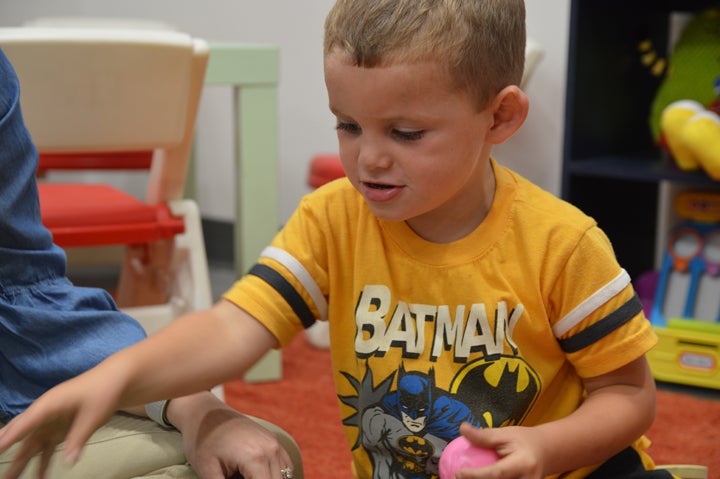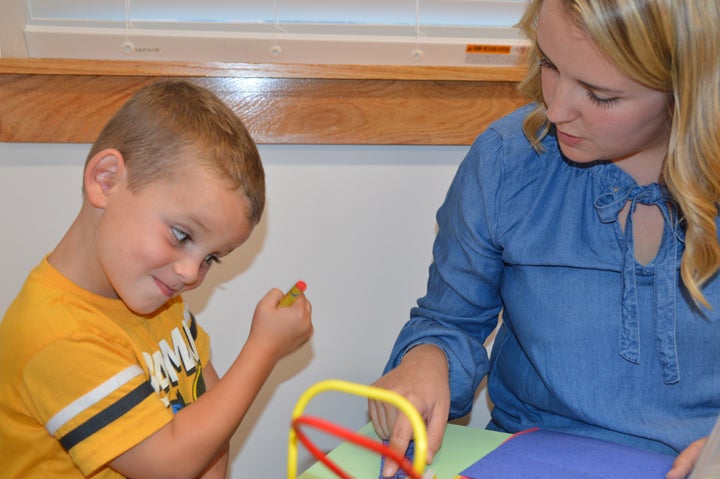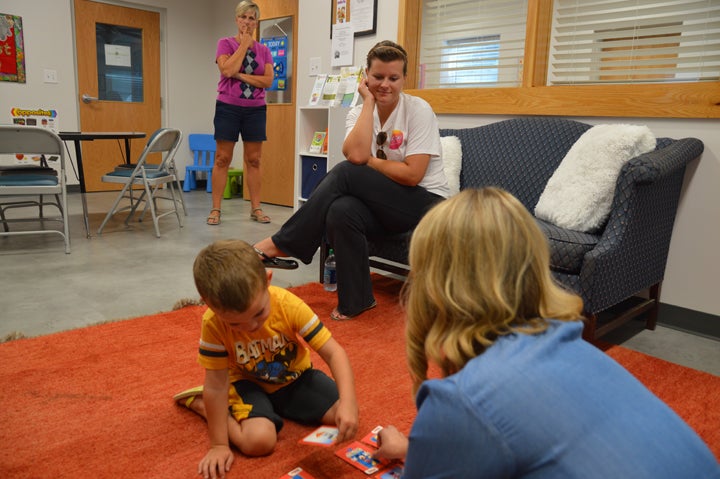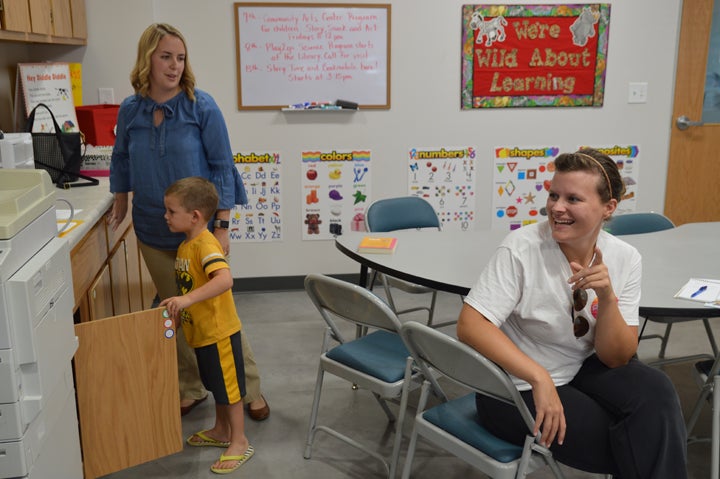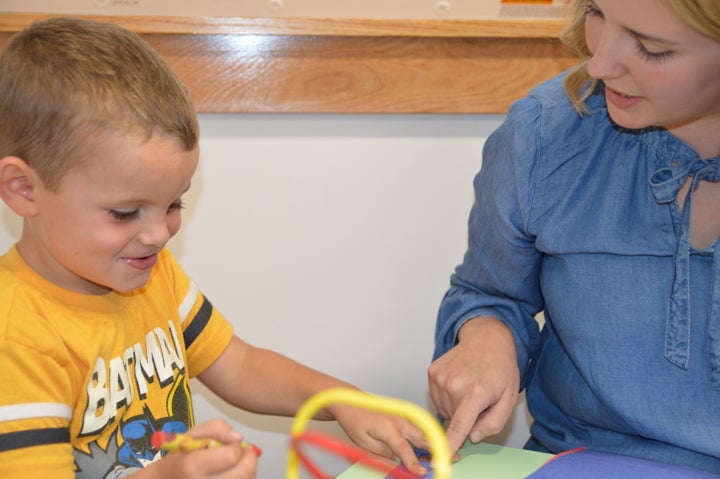Learning to love learning: Non-profit Gladys Project works to help close learning gaps
Published 6:17 am Tuesday, September 18, 2018
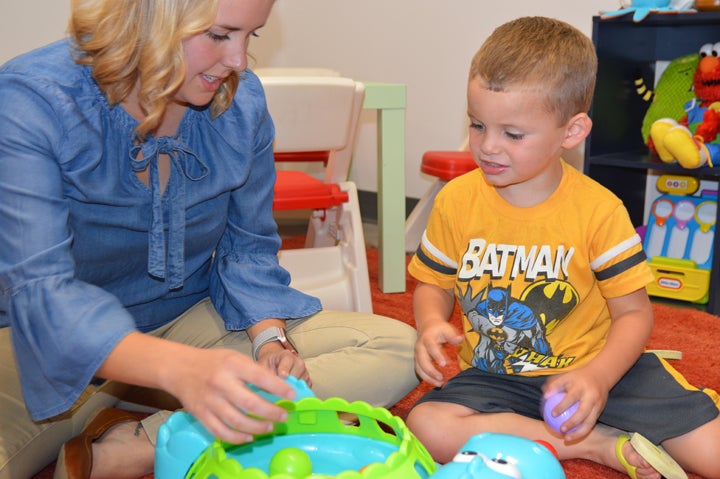
- Photos by Bobbie Curd/ bobbie.curd@amnews.com Middle school teacher and volunteer Megan Elsea works with Harper Hughes, 4, on a motor skills activity at The Gladys Project.
A local non-profit is striving to bridge the learning gap for children, with its mission of removing educational barriers so that each and every one is ready to start kindergarten. But it needs more families to realize it’s even out there and providing help — for free.
The Gladys Project has been functioning since 2014, the brainchild of Elaine Wilson-Reddy. In 2005, she substitute taught for a friend who is a kindergarten teacher, during the beginning of the year. Her friend warned her that some of the children didn’t know how to hold their pencils yet.
“I was shocked when I found out she was right. Some could write their name in cursive, while others didn’t have the skill to hold a pencil. That stayed with me for years.”
Wilson-Reddy says fast-forward to 2014, and she was volunteering for the Trinity Church reading camp, where her job was to listen and coach individuals while they read aloud.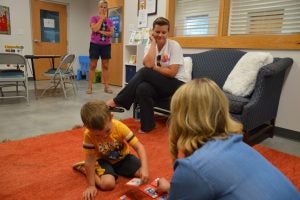
“Once again, I was stunned and saddened by the children who didn’t have strong reading skills.” She began doing research to find a way to solve these problems, and discovered that all learning begins at birth. “And most brain connections are already made by 3 years old. If children didn’t have a strong adult reading presence in their home, they would become the children who couldn’t hold a pencil or read well.”
Wilson-Reddy also discovered that the lack of access to preschool was a key. So, The Gladys Project was born, named after her mother and grandmother, and fully functional by 2016. Now, it has a home on Crescent Drive, thanks to the Housing Authority which donates the space rent-free, and also doesn’t charge them utilities.
“We are very lucky they’ve helped us,” says Susie Allen, president of the organization’s board. She says they are also lucky to be a partner with the Heart of Kentucky United Way, the project’s biggest funder.
Now, they need more families and volunteers to join them. The only paid position in the project is that of Executive Director Amy Trisler Adkins, who recently joined to head-up the operation, with more than 16 years of experience working with children and families. She was an elementary school teacher as well as a director of a learning center in Harrodsburg, and holds an Early Care and Education Trainer’s Credential from the Kentucky Division of Child Care.
The rest are volunteer board members, as well as others who come in and commit to roughly an hour of time each week with their assigned family. They read with the child and do other educational activities, like working on colors and sequences.
…
Harper Hughes, 4, repeats counting cards back to volunteer Megan Elsea. It’s like the memory game; Harper flips one card over with a yellow square and another with a blue triangle, and Elsea asks him what the colors, shapes and numbers are.
His mom, Mary Hughes, sits quietly in the background, watching. She says Harper is the more active, “sporty” child in her family and struggled a bit with focusing on reading. When she was told about The Gladys Project by board member and friend Wayne Burke, she was shocked that it was free of charge.
“It’s been absolutely great,” Hughes says from around the corner from where Elsea is working with her son.
Harper only qualified for a half-day of preschool, since so many who were 5 and weren’t able to go got in before him in Junction City.
“Maybe his brother is a little ahead, but I didn’t want him falling behind.”
Hughes says she would’ve never thought there was help like this out there for families.
“It’s just really nice here, it’s clean, he gets a lot of attention and the volunteers are great. And when I called her, I asked how much each session cost — when they said free, I was like how does this happen?”
She said at home, Harper has a hard time focusing on reading. When he’s here, volunteer Elsea — in her fifth year as a Boyle County Middle School teacher.
“So I think the neat thing for me … the reading and writing skills are super important, but developing the love of learning is so important. I usually see the back end of it,” Elsea says. Even at the middle school level, she gets students she can tell are still struggling with learning. And the sessions are so much more than just reading.
“And I see those who I know would’ve really benefited from literacy and learning at an earlier age, by coming somewhere like this,” Elsea says. “But it’s not just reading. It’s their personal-social skills, communication skills. I think figuring that out at such a super-young age, those things are what carry on through elementary, middle and high school. They’re the things that help you adapt to a world that’s changing.”
Harper says his favorite part of the sessions are coloring the chain when he’s done, made with shaped cut outs of white paper. Elsea asks him to color a triangle orange and a square red, and he immediately starts scanning the crayons.
This is Elsea and Harper’s fourth visit together, and it’s easy to see he’s very familiar with her.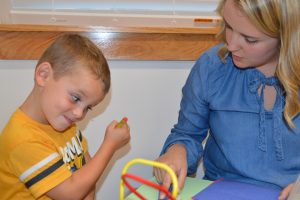
“This really takes him out of his comfort zone,” Hughes says. He mostly likes active things outside, but she notices when he’s here, with Elsea — he focuses more.
“He also helps clean up way better than he does at home,” Hughes says and laughs. But she notices, when he comes here and all eyes are on him, he very much wants to finish each activity, and wants to do them correctly.
…
Any family from any area is accepted at The Gladys Project, but board member Allen and director Adkins both say they try to reach out within the housing community to get the word to low-income families. They’ve held resource fairs at the library, and have joined in on the Centre College career expos in order to bring in some college students to help with sessions.
Any volunteer will be asked to commit to an hour a week, something Allen says turns out to be a priceless connection. That’s why Allen began volunteering.
“I read about the project in the paper a few years back, and I thought this is a good program. You do things like this hoping you make a difference,” Allen says. Most families continue the sessions throughout summer, too.
The Gladys Project also has a partnership with the library, where the Bookmobile comes at 3:15 p.m. every second and fourth Thursday of the month. Brittany Smith is great, both Allen and Adkins say, and even plays guitar and sings with the kids, in addition to reading to them.
Every fourth session a family has, they get to take home a new book, so any book donations are always welcome, as well as any types of puzzles or activities requiring motor skills.
But what they really need are families to be aware of what they offer, and that they do it for free.
“We don’t ask any financial questions for anyone to come. If you want to bring your child here, we will take them … We want to show them the importance of reading,” Allen says. She says it’s not just an educational tool for the kids, it’s for the parents, too. They are asked to take the information home they learn from the sessions to try and integrate into their family’s life.
“We try to make it easy for parents. We send them home with things to work on, so we make them responsible for the learning material too. They are asked to go home and either do something similar, or just to read to them,” Adkins says.
Children are given an assessment to see where they stand before starting the program, and are never left alone with a volunteer. A parent and either Adkins or a board member are always on-hand. They work with children from birth to 5.
“The session times are set up between the volunteer and the family so it can accommodate everyone’s schedule,” Allen says. This is something they want to make easy for families, so they can stick to it and make a real difference in their child’s learning process.
“The volunteers are not only trained, but are passionate about helping children reach their full potential to be prepared for school,” Wilson-Reddy says. “If a family does not have access to preschool, their child needs The Gladys Project.”
SO YOU KNOW
Anyone interested in volunteering, participating as a family or wishing to make a donation can contact The Gladys Project by calling (859) 209-1618, or emailing thegladysproject@gmail.com. It is located at 456 Crescent Drive.
- Megan Elsea, a middle school teacher and volunteer with The Gladys Project
- Susie and Amy Trisler
- Mary Hughes, mother of Harper Hughes
- Elsea and Harper enjoying a learning activity involving cards with shapes and colors on them.
- Harper and mom Mary Hughes both say they enjoy the sessions at The Gladys Project.
- Harper Hughes, 4, at his fourth learning session with Megan Elsea.


